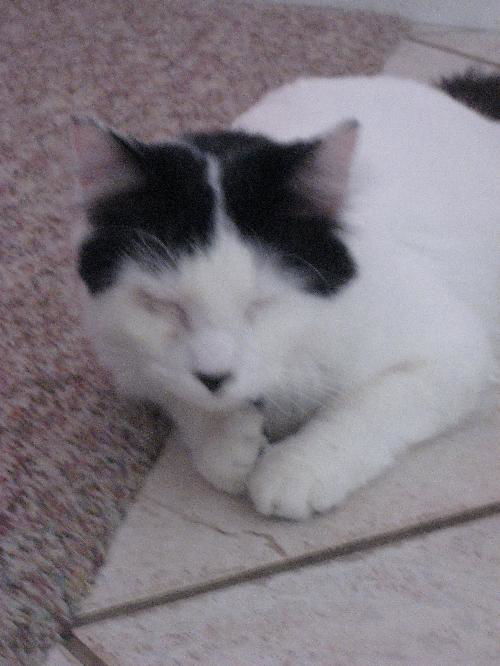Welcome to Pet Rescue By Judy!
401 South Laurel Avenue
Sanford, FL 32771
(407) 302-4497
info@petrescuebyjudy.com
Berkley the Spotted Cat's Web Page

| My Rescue |
| Login to Remember your Favorite Animals and Breeds! |
Name: Berkley the Spotted Cat
Status: Adopted!
Adoption Fee: $125
Species: Cat
Breed: Domestic Medium Hair / Turkish Van (medium coat)
Color: White-Black Spots
Sex: Male (neutered)
Current Size: 7 Pounds
Potential Size: 8 Pounds
General Potential Size: Medium
Current Age: 17 Years 10 Months (best estimate)
Activity Level: Moderately Active
Indoor or Outdoor: Indoor Only
Good with Cats: Yes
Declawed: No
Housetrained: Yes
Microchipped: Yes
Berkley the Spotted Cat's sister, Elitchi the LoveBug (adopted) can also be seen on our website.
Description:
Berkley is a sweet heart. He is very love able at the first sight, and is good with all kids of all ages! Berkley needs a loving good home. He has some great markings that make me wonder if he is a Turkish Van mix. And his plummed tail is adorable! This very loving cat has been waiting since January of 2008 for a home ~ can you believe that? Thank goodness for our fosters!
5/27 volunteer Update:
"Berkley has gotten SO BIG!!! I can't believe it! But he's still as sweet as ever and he still loves his lap time. I have no room for him at my house, but I'd scoop him up if I could. "
According to www.cat-lovers-only.com, cats have been domesticated for well over 3,000 years. House cat behavior patterns, however, are really not all that different from wild cats. In fact, the basic instincts and resulting patterns of activity and rest are basically the same as they were before domestication. Long before the Egyptians and African wild cats negotiated the original deal with each other of pest control for steady food and shelter, cats were hunting, stalking, and burying their feces in sandy substrate.
Remember that what at first may be seen as bad cat behavior may have a reason behind it. Here's some insight that answers some questions on why your feline friend does certain things a certain way.
The current behavior of today's house cats with respect to chasing mice, grabbing ankles, playing with toys, tearing into arms with back claws, and litter box behavior have their origins in those ancient felines. Stalking and hunting behaviors are deeply ingrained and cannot be trained out of your cat. As feline parents, we act as surrogate mothers for our cats, and we encourage kitten-like dependency and play behavior that lasts into adulthood.
Underneath all that, however, our little bundles of fur are really just wild animals that have become our family members.
A better understanding of cat behavior will allow you to provide better cat care for your little one. Understanding your cat's point of view and her special needs will help you to better enjoy your companion animal and treat your cat more the way she wants to be treated. This can help both of you to live a more enriched life. Embracing your cat's wild nature is essential. Part of that is to refrain from attempting to inflict a human measurement of punishment on your cat for things she can't control. You can't blame your cat for behaviors like the desire to hunt or attack, or for being choosy about the food she eats, or for not using a less than clean litter box. You can't blame her for going through the processes that lead to mating, including wanting to get out and meet other cats.
What you can do, instead, is play to her instincts and needs in order to create a healthy and cat friendly environment. When you do so, you'll find that your furry companion will be much better behaved. It is highly suggested that you set up a cat sanctuary so that your cat has a safe and quiet place to rest and play.
Domestic felines are extremely territorial and will defend their territory very much as they would if they lived in the wild. Cats are opportunists, and while they bond to their people and other animals they live with, they often will go wherever they find better food or amenities. Cats mark their territory with scent glands in various areas of the body, including the face, head, and tail. They may also urine spray to mark territory. Cat spraying behavior can become a real problem if it's happening inside the home. Stray cats may spray the outside of your house and create a defensive response in your cat, which ends up manifesting in the form of spraying indoors. There are a number of things you can do to stop spraying behavior, including reducing stress.
Most indoor cats will agree to share territory and time share specific "favorite spots" with the other cats in the house. Disputes occur, but they're usually not major. Aggression between two or more cats in multi-cat households is often due to territorial disputes t
Berkley is a sweet heart. He is very love able at the first sight, and is good with all kids of all ages! Berkley needs a loving good home. He has some great markings that make me wonder if he is a Turkish Van mix. And his plummed tail is adorable! This very loving cat has been waiting since January of 2008 for a home ~ can you believe that? Thank goodness for our fosters!
5/27 volunteer Update:
"Berkley has gotten SO BIG!!! I can't believe it! But he's still as sweet as ever and he still loves his lap time. I have no room for him at my house, but I'd scoop him up if I could. "
According to www.cat-lovers-only.com, cats have been domesticated for well over 3,000 years. House cat behavior patterns, however, are really not all that different from wild cats. In fact, the basic instincts and resulting patterns of activity and rest are basically the same as they were before domestication. Long before the Egyptians and African wild cats negotiated the original deal with each other of pest control for steady food and shelter, cats were hunting, stalking, and burying their feces in sandy substrate.
Remember that what at first may be seen as bad cat behavior may have a reason behind it. Here's some insight that answers some questions on why your feline friend does certain things a certain way.
The current behavior of today's house cats with respect to chasing mice, grabbing ankles, playing with toys, tearing into arms with back claws, and litter box behavior have their origins in those ancient felines. Stalking and hunting behaviors are deeply ingrained and cannot be trained out of your cat. As feline parents, we act as surrogate mothers for our cats, and we encourage kitten-like dependency and play behavior that lasts into adulthood.
Underneath all that, however, our little bundles of fur are really just wild animals that have become our family members.
A better understanding of cat behavior will allow you to provide better cat care for your little one. Understanding your cat's point of view and her special needs will help you to better enjoy your companion animal and treat your cat more the way she wants to be treated. This can help both of you to live a more enriched life. Embracing your cat's wild nature is essential. Part of that is to refrain from attempting to inflict a human measurement of punishment on your cat for things she can't control. You can't blame your cat for behaviors like the desire to hunt or attack, or for being choosy about the food she eats, or for not using a less than clean litter box. You can't blame her for going through the processes that lead to mating, including wanting to get out and meet other cats.
What you can do, instead, is play to her instincts and needs in order to create a healthy and cat friendly environment. When you do so, you'll find that your furry companion will be much better behaved. It is highly suggested that you set up a cat sanctuary so that your cat has a safe and quiet place to rest and play.
Domestic felines are extremely territorial and will defend their territory very much as they would if they lived in the wild. Cats are opportunists, and while they bond to their people and other animals they live with, they often will go wherever they find better food or amenities. Cats mark their territory with scent glands in various areas of the body, including the face, head, and tail. They may also urine spray to mark territory. Cat spraying behavior can become a real problem if it's happening inside the home. Stray cats may spray the outside of your house and create a defensive response in your cat, which ends up manifesting in the form of spraying indoors. There are a number of things you can do to stop spraying behavior, including reducing stress.
Most indoor cats will agree to share territory and time share specific "favorite spots" with the other cats in the house. Disputes occur, but they're usually not major. Aggression between two or more cats in multi-cat households is often due to territorial disputes t
Video of Berkley the Spotted Cat:

Other Pictures of Berkley the Spotted Cat (click to see larger version):
 31k |
 36.3k |
 25k |
Copyright © Pet Rescue by Judy





